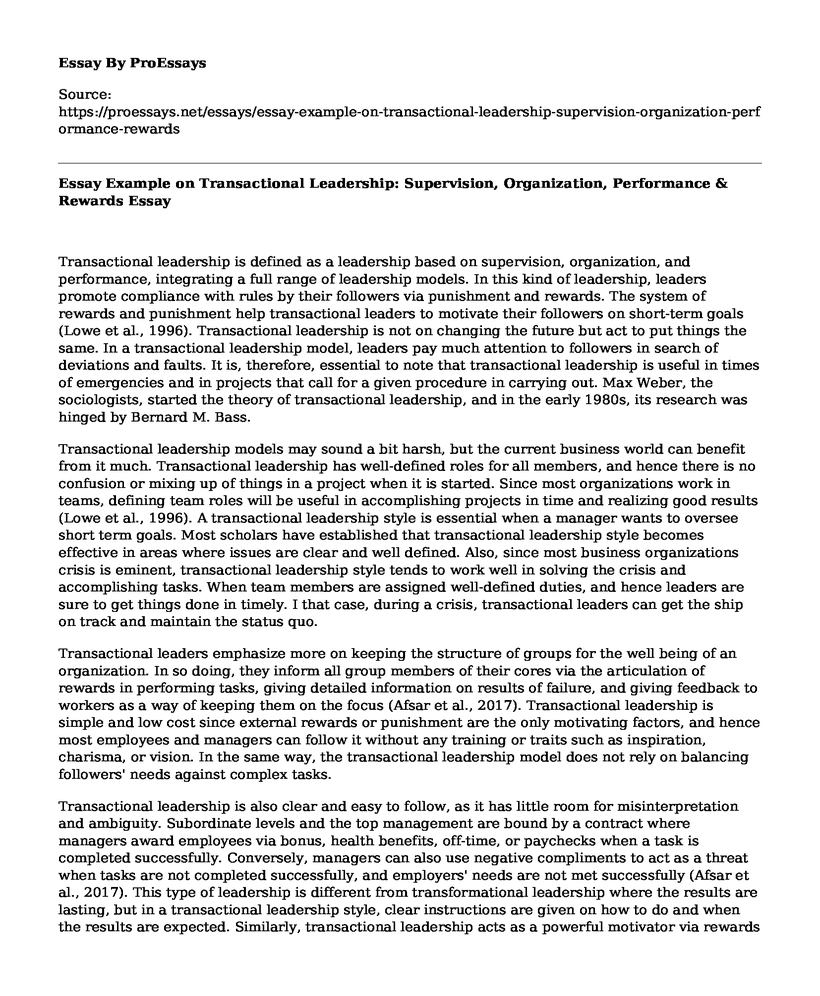Transactional leadership is defined as a leadership based on supervision, organization, and performance, integrating a full range of leadership models. In this kind of leadership, leaders promote compliance with rules by their followers via punishment and rewards. The system of rewards and punishment help transactional leaders to motivate their followers on short-term goals (Lowe et al., 1996). Transactional leadership is not on changing the future but act to put things the same. In a transactional leadership model, leaders pay much attention to followers in search of deviations and faults. It is, therefore, essential to note that transactional leadership is useful in times of emergencies and in projects that call for a given procedure in carrying out. Max Weber, the sociologists, started the theory of transactional leadership, and in the early 1980s, its research was hinged by Bernard M. Bass.
Transactional leadership models may sound a bit harsh, but the current business world can benefit from it much. Transactional leadership has well-defined roles for all members, and hence there is no confusion or mixing up of things in a project when it is started. Since most organizations work in teams, defining team roles will be useful in accomplishing projects in time and realizing good results (Lowe et al., 1996). A transactional leadership style is essential when a manager wants to oversee short term goals. Most scholars have established that transactional leadership style becomes effective in areas where issues are clear and well defined. Also, since most business organizations crisis is eminent, transactional leadership style tends to work well in solving the crisis and accomplishing tasks. When team members are assigned well-defined duties, and hence leaders are sure to get things done in timely. I that case, during a crisis, transactional leaders can get the ship on track and maintain the status quo.
Transactional leaders emphasize more on keeping the structure of groups for the well being of an organization. In so doing, they inform all group members of their cores via the articulation of rewards in performing tasks, giving detailed information on results of failure, and giving feedback to workers as a way of keeping them on the focus (Afsar et al., 2017). Transactional leadership is simple and low cost since external rewards or punishment are the only motivating factors, and hence most employees and managers can follow it without any training or traits such as inspiration, charisma, or vision. In the same way, the transactional leadership model does not rely on balancing followers' needs against complex tasks.
Transactional leadership is also clear and easy to follow, as it has little room for misinterpretation and ambiguity. Subordinate levels and the top management are bound by a contract where managers award employees via bonus, health benefits, off-time, or paychecks when a task is completed successfully. Conversely, managers can also use negative compliments to act as a threat when tasks are not completed successfully, and employers' needs are not met successfully (Afsar et al., 2017). This type of leadership is different from transformational leadership where the results are lasting, but in a transactional leadership style, clear instructions are given on how to do and when the results are expected. Similarly, transactional leadership acts as a powerful motivator via rewards in terms of money.
Examples of transactional leaders include managers from corporations and in local companies. For instance, Vimal Shah, the President of Bidco, acts as a transactional leader via autorotating tasks to be done on a timely basis. Other examples include Bill gate, the founder, and the president of Microsoft.
References
Afsar, B., Badir, Y. F., Saeed, B. B., & Hafeez, S. (2017). Transformational and transactional leadership and employee's entrepreneurial behavior in knowledge-intensive industries. The International Journal of Human Resource Management, 28(2), 307-332.
Lowe, K. B., Galen, Kroeck, K., & Sivasubramaniam, N. (1996). Effectiveness correlates of transformational and transactional leadership: A meta-analytic. Leadership Quarterly, 7(3), 385.
Cite this page
Essay Example on Transactional Leadership: Supervision, Organization, Performance & Rewards. (2023, Apr 09). Retrieved from https://proessays.net/essays/essay-example-on-transactional-leadership-supervision-organization-performance-rewards
If you are the original author of this essay and no longer wish to have it published on the ProEssays website, please click below to request its removal:
- Research Proposal Example on Toxic Leadership in Organizations
- Lifeline Project Paper Example
- The Hotel Simulation Tool Paper Example
- Technical Skills of Csirt Team: Reply to Student's Post Paper Example
- Vulnerability Management Development Paper Example
- Essay Example on Shareholder Rights & Privileges: Key to Stock Valuation
- The Power of Leadership: Impacting Followers and Organizations - Essay Sample







